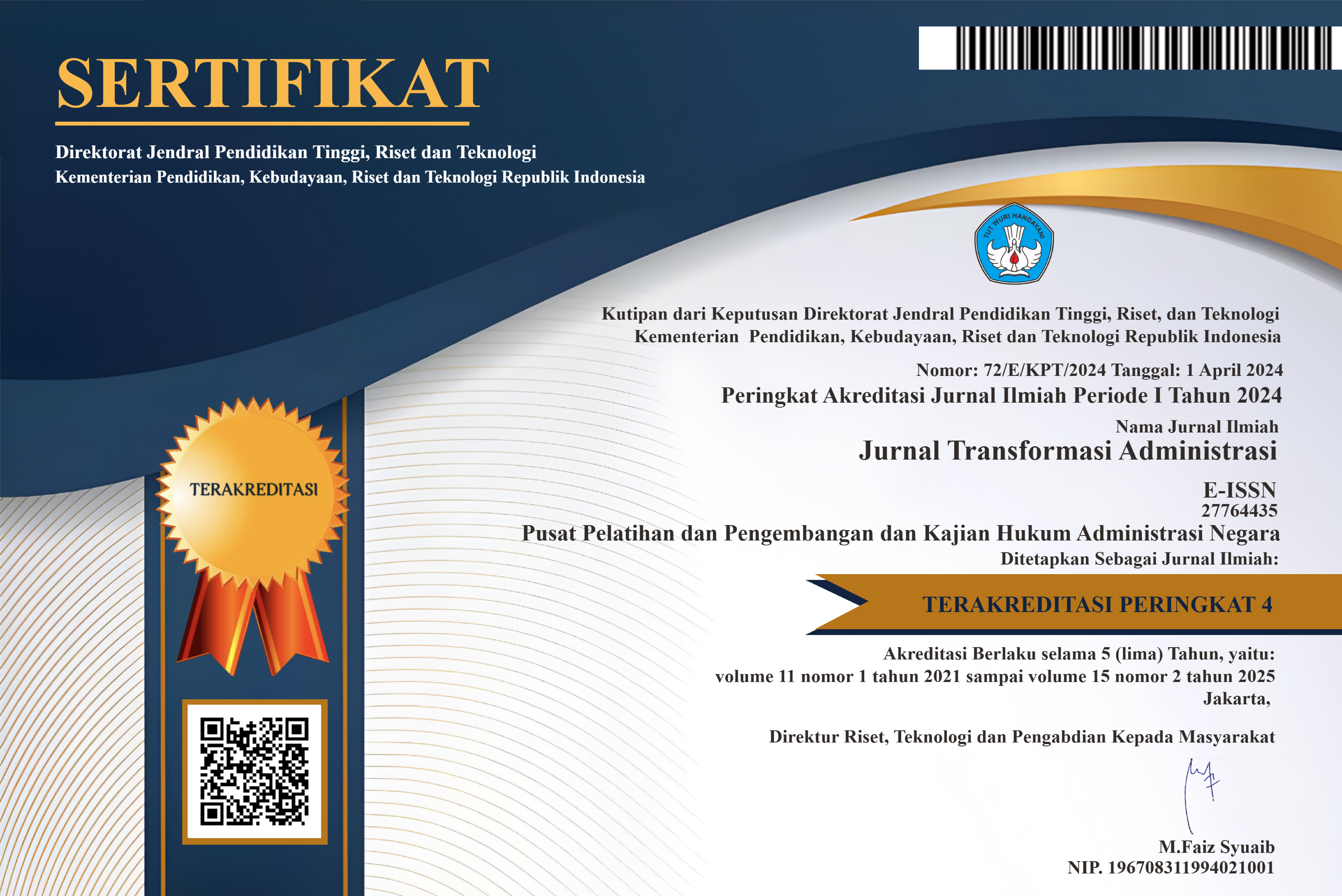Grow Model As An Alternatif Approach To Coaching Process In Leadership Training And Education Level IV At PKP2A II LAN
Keywords:
Coach, GROW, PKP2A II LANAbstract
The practice of coaching at Lembaga Administrasi Negara starts when the new pattern of training and education on Leadership Training and Prajabatan Training was implemented. One of the models was GROW developed by John Whitmore. The aim of the the present research was to examine the GROW model as an alternatif approach to the process of coaching in leadership education and training at PKP2A II LAN. Using qualitative data from 33 informants, the current research showed that the GROW model can be used as an alternatif approach to the coaching process in leadership education and training level IV. The practice of the model was mainly seen on goal, reality, and will phase.
References
Asmoko, Hindri. 2015. dan Coaching Mentoring Faktor Penting dalam Diklat , Kepemimpinan Pola Baru. BDPim. Magelang.
Feldman, D. C., & Lankau, M. J. 2005. Executive : A Review and Coaching Agenda for Future Research. Journal of Management, 31, 829–848. http://dx.doi.org/10.1177/0149206305279599.
Grant, A. M. 2013. The efficacy of .In coaching J. Passmore, D. B. Peterson, and T. Freire (Eds.). Wiley-Blackwell Handbooks in Organizational Psychology. UK: John Wiley & Sons, Ltd .pp.15-39.
Grant, A. M., Passmore, J., Cavanagh, M. J., &Parker, H. M. (2010). The state of play in today: A coaching comprehensive review of the field. International Review of Industrial and Organizational Psychology, 25, 125–168.
Habig, J., & Hoole, E. 2015.Evaluating Coaching Interventions. In E. R. Hoole, E. C. D. Gullette, & D. D. Riddle (Eds.), The Center for Creative Leadership Handbook of Coaching in Organizations (81-112). USA: JohnWiley & Sons, Inc.
Passmore, J. 2010. Excellence in Coaching: Panduan Lengkap Menjadi Coach Profesional. Edisi Terjemahan. Penerbit PPM. Jakarta.
Prastowo, Andi. 2011. Metode Penelitian Kualitatif dalam Perspektif Rancangan Penelitian.Ar-Ruzz Media. Jogjakarta.
Smither, J.W., London, M., Flautt, R., Vargas, Y., & Kucine, I. 2003. Can working with an executive improve multisource coach feedback ratings over time? A quasiexperimental field study. Personnel Psychology, 56, 1, 23-44.
Sonesh, S. C., Coultas, C. W., Marlow, S. L., Lacerenza, C. N., Reyes, D., & Salas, E. 2015. in the wild: Identifying Coaching factors that lead to success.Consulting Psychology Journal: Practice and Research, 67(3), 189-217.
Spence , G.B. and Grant , A. ( 2007 ) Professional and peer life and coaching the enhancement of goal striving and well-being: An exploratory study . The Journal of Positive Psychology, 2, 185 – 94 .
Theeboom, T., Beersma, B., & van Vianen, A. E. (2014).Does work? A metacoaching analysis on the effects of on coaching individual level outcomes in an organizational context.The Journal of Positive Psychology 9 , (1), 1-18.
Whitmore, J. (2010). Coaching for performance: growing human potential and purpose: the principles and practice of coaching and leadership. Nicholas brealey publishing.
Whitmore, John. 2003. Coaching for Performance Seni Mengarahkan untuk Mendongkrak Kinerja. Edisi Terjemahan. Penerbit PT Gramedia Pustaka Utama. Jakarta.
Whitmore, S. J. (1994). Coaching for performance: A practical guide to growing your own skills.Pfeiffer & Company by arrangement with N. Brealy Publ. Wilson, C. 2011. Performance Coaching Metode Baru Mendongkrak Kinerja Karyawan.Edisi terjemahan. Penerbit PPM. Jakarta.
Peraturan Perka LAN No 19 tahun 2015 tentang Pedoman Penyelenggaraan Diklat Kepemimpinan Tingkat III.
Perka LAN No 20 tahun 2015 tentang Pedoman Penyelenggaraan Diklat Kepemimpinan Tingkat IV.















